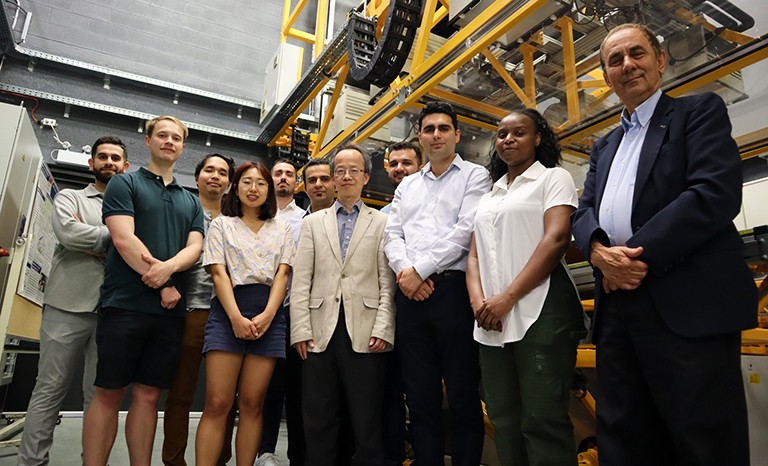Concordia-led partnership looks to transform energy management in buildings across Canada
Imagine a future where buildings not only consume energy but actively contribute to a more stable and efficient power grid.
Concordia and its partners Hydro-Québec, Régulvar, CanmetENERGY and BGI Analytics have committed $2,012,000 cash and $770,000 in kind over five years to transform energy management in buildings across Canada. The funding supports a research initiative that seeks to better integrate renewable energy resources into buildings and enhance interaction with the smart grid, an electricity network that uses digital technology to monitor and manage the transport of electricity.
The project is led by Andreas Athienitis, professor of building, civil and environmental engineering in Concordia’s Gina Cody School of Engineering and Computer Science. Athienitis also directs the Centre for Zero Energy Building Studies, home to experimental facilities like the Solar Simulator and Concordia’s Future Buildings Laboratory, and chair of the CFREF Volt-Age Scientific Committee.
The main funders are Natural Sciences Engineering Research Council of Canada (NSERC) Alliance Grants, Hydro-Québec and Mitacs Accelerate programs.
Beyond renewable energy
The research initiative will focus on three main areas:
- Modelling building energy flexibility to predict and apply energy usage patterns, including integration of distributed renewable energy resources with onsite energy generation in buildings
- Scaling predictive control strategies from individual buildings to larger clusters and communities for more efficient energy distribution, which means developing methods to apply energy management techniques used in single buildings to entire groups of buildings
- Implementing these strategies in real-world case studies to evaluate their effectiveness
The program builds on progress achieved under Athienitis’ NSERC Industrial Chair program, with significant contributions from Concordia’s team in modeling and quantifying building energy flexibility. Expected outcomes include novel model predictive control strategies and retrofit measures to reduce peak demand and facilitate renewable energy integration.
“This research exemplifies Concordia’s commitment to addressing critical energy challenges,” says Emad Shihab, associate dean of research and innovation at the Gina Cody School.
“It showcases a dedication to pioneering solutions that advance energy management and sustainability.”
 The Solar Simulator lab team (from left): Hamidreza Zarrinkafsh, Jean-Christophe Pelletier-De Koninck, Gia-Khanh Phi, Yearim Yang, Anthony Maturo, Mahmoud Reza Hamidpour, Jiwu Rao, Vahid Nourmohammadi, Navid Morovat, Blessing O. Ayegba and Andreas Athienitis.
The Solar Simulator lab team (from left): Hamidreza Zarrinkafsh, Jean-Christophe Pelletier-De Koninck, Gia-Khanh Phi, Yearim Yang, Anthony Maturo, Mahmoud Reza Hamidpour, Jiwu Rao, Vahid Nourmohammadi, Navid Morovat, Blessing O. Ayegba and Andreas Athienitis.
‘Buildings consume over half of Canada’s electricity’
While Quebec’s electricity grid is already almost fully renewable, customers are increasingly interested in resources that lower electricity costs and optimize the electric system as a whole. Reasons for this shift include dynamic tariffs, which are pricing schemes that adjust electricity prices based on demand at different times of the day, and the electrification of transport.
“Small-scale energy resources, otherwise known as distributed energy resources such as building-integrated solar systems and building-connected electric vehicles, will fundamentally change grid operations,” Athienitis explains.
“Utilities must adapt. How they deliver electricity must change, but they also need to leverage building load flexibility, building-integrated renewable energy systems and building-connected electric vehicles,” he adds.
“Buildings, which consume over half of Canada’s electricity, offer substantial potential for developing this type of flexibility.”
Improving sustainability through industry partnerships
Athienitis’s team will partner with Hydro-Québec under its Chairs program. The corporation’s involvement reflects its strategic plan to help the province achieve net-zero emissions by 2050, leveraging advanced control strategies and technologies to optimize energy efficiency and power-demand management.
Régulvar, a leader in building automation, and BGI Analytics, a startup specializing in advanced control methods and data analytics, are also partners.
CanmetENERGY, a Government of Canada energy technology centre, will support dissemination and testing of optimal building operating strategies.
“This collaboration aims to create actionable knowledge and advanced technologies essential for the energy transition,” says Athienitis. “The research will not only benefit Hydro-Québec but also provide valuable insights and solutions for the building sector, enhancing energy efficiency and flexibility across Canada.”
Find out more about the Concordia’s Centre for Zero Energy Building Studies.



